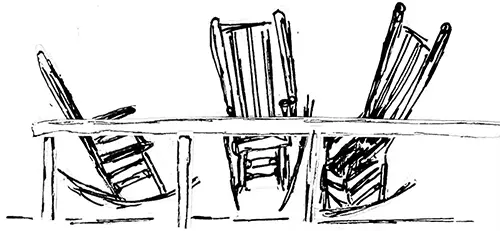The Nightstand 451
The Domestic Arts: Finding a Quiet Dignity in the Mundane
As Sarah Orne Jewett knew, "everyday tasks” and the celebrations they engender are the condition upon which many other arts rest, including poetry.
Calling For A 21st-Century Magna Carta: A Review of Joel Kotkin’s The Coming Neo-Feudalism
The global middle class of Kotkin’s subtitle must unite with the working class for a new Magna Carta for the 21st Century, one that will, in Lincoln’s words, make us…
Free America, The Front Porch Republic, and America’s Decentralist Tradition
The contributors to Free America belonged to one another and to the vision of a humane society, one founded on distributed property. Just because this vision has been drowned out…
Culinary Plagiarist: An Interview with the “Author”
Recently FPR's Bar Jester sat down with the Culinary Plagiarist to discuss a new book by Jason Peters, The Culinary Plagiarist: (Mis)Adventures of a Lusty, Thieving, God-Fearing Gourmand.
Work and Prayer: The Brief Friendship of Thomas Merton and Wendell Berry
Berry wrote in one of his letters to Merton that “you are one of the few whose awareness of what I’m doing here would be of value to me.” He…
For the Hog Killing, 1979 and the Work of Photography
Perhaps the appealing vision of neighborliness that For the Hog Killing, 1979 presents, and the image of agricultural community that it provides, can challenge those of us who are encouraged…
Tanya Berry’s Faithful Art
Women like Tanya bring artistry and honor to everything they touch: the homes they inhabit, the land they steward, the children they raise. These photographs are testimony to the clear,…
On Flannery O’Connor and Jack Black
Maybe O’Connor’s narrative can teach us that people—and the places they call home, the places that form them—need not be defined by their flaws.
They Stood On Their Feet
The poetry in this book captures some of those everyday moments and holds them up in a light that makes possible another kind of clarity, not that of simply worded…
Thinking about the Post-Pandemic (and, Maybe, the Post-Suburban) Neighborhood
Chuck Marohn's work, whatever disagreements one may have with it, gives us some good counsel on where to start changing suburban-addicted minds and fiscal incentives.
Imagining Divine Participation
No matter how fallen or distant from God the world around us may seem, the distance is never absolute.
Consider the Forest: A Review of Peter Wohlleben’s The Hidden Life of Trees
If a human timescale—privileging our experience and our hopes—is insufficient to understand the forest, then maybe we will be provoked to reconsider both the human and forestal timescale.
Christian Anarchy Come of Age: Dorothy Day and the Common Good
In Journey Films’ documentary, Dorothy Day: Revolution of the Heart, Day is reintroduced to a new audience, emphasizing Day not as a patron saint of the poor or primarily as…
Between Port Royal and Patagonia
Being wealthy doesn’t make Chouinard a better representative of the values that he shares with Berry, but recognizing that Berry is not alone and that these values can be brought…
Wholeness and Gratitude: Working through Scott H. Moore’s How to Burn a Goat
Moore insists that his book about farming is not exclusively about rural places: “the point is not even about farming . . . most of what I’ve said in this…
Poems, Essays, Stories, and Songs for a Pandemic
When despair for the world grows in me . . .
The Ordinary Christian Option
Elevated figures in church history have a great deal to teach us, but we should not forget that we can also learn from the early, run-of-the-mill Christians who were as…
An Artistic Ecosystem: A Review of Makoto Fujimura’s Culture Care
If truth, beauty, and goodness are truly and mystically related, beauty really is dangerous—but only to evil. Reading Culture Care, and contemplating Makoto Fujimura’s art, I can believe it.
Graced Grit: A Hymn-laced Eulogy to True Grit Author Charles Portis
U.S. Marshal Reuben J. “Rooster” Cogburn and Mattie bring a type of vigilante justice to Tom Chaney, and we are glad, but Portis doesn’t allow us to be easy about…
From Decadent to Local
It’s true that we don’t yet have a colony on Mars. But countless people are living very ordinary lives and doing very ordinary things that are true, good, and beautiful.
Christian Ecological Virtues
There is much to admire in Bouma-Prediger’s approach to environmental ethics. If practiced within the context of a robust Christianity, the virtues he recommends would certainly help readers become better…
Yearning for Eden: Horace and the Romance of Agrarianism
Deep within the Western psyche and tradition is this yearning for return. Horace, more than any other of the grandiose poets of antiquity, captured that call, that cry, for return—a…
Power, Friendship, and a Better Set of Democratic “Rules”
For those tired of the fake news and play hate, who are convinced by Austin and their own better natures that accomplishing something better is actually still possible within the…
Two Cheers for Two Popes
In short, we need to rely less on building rigid ideological superstructures and more on our guts, guts kept healthy by a diverse diet of conversation and friendship. We need…














